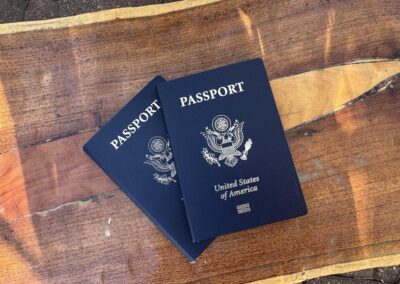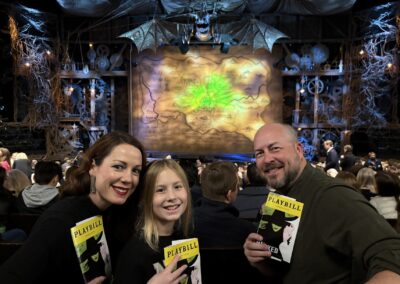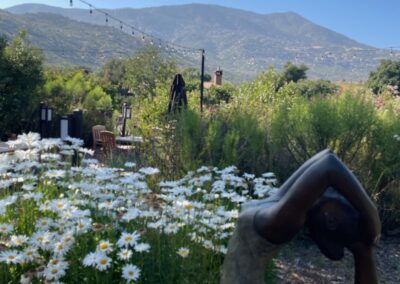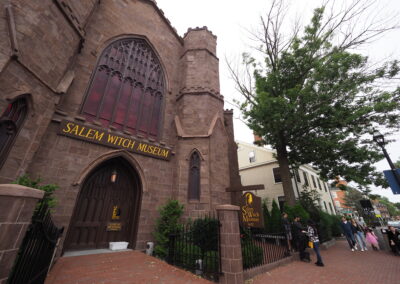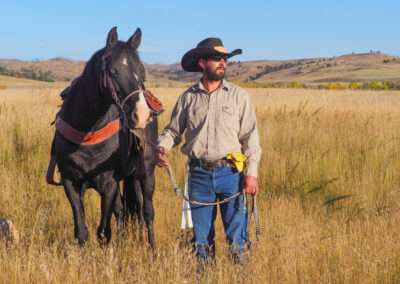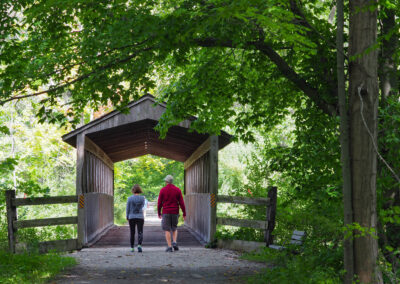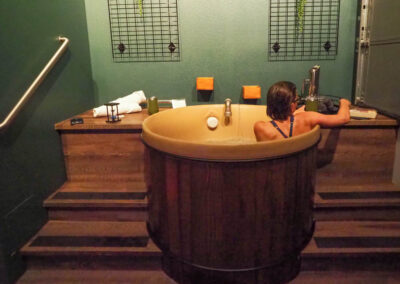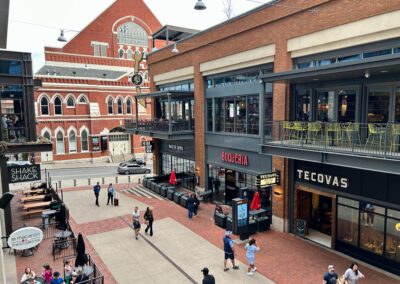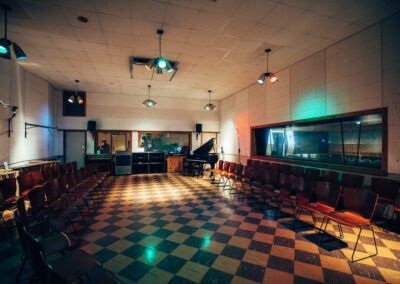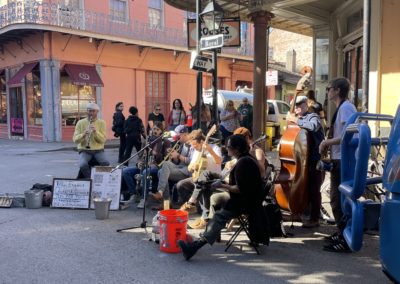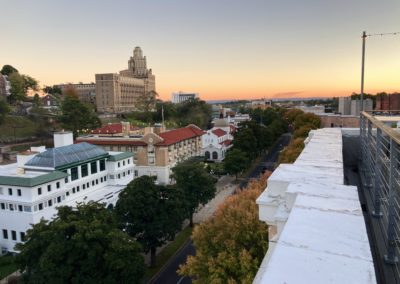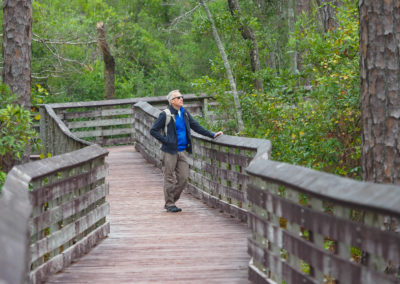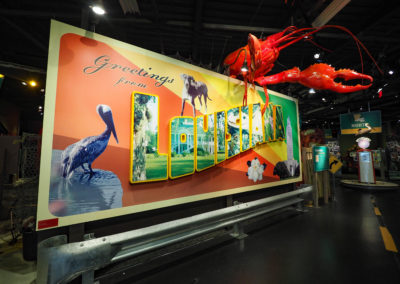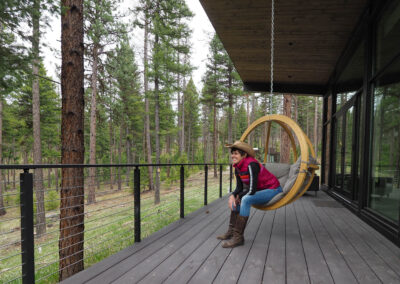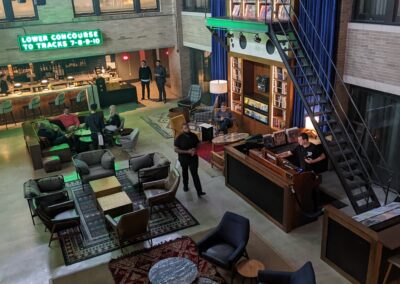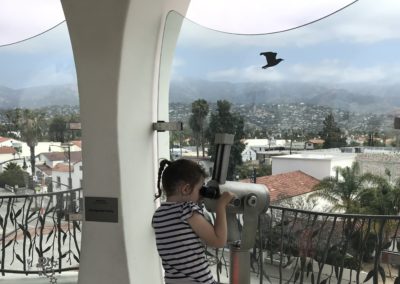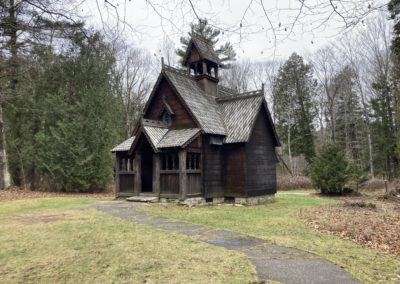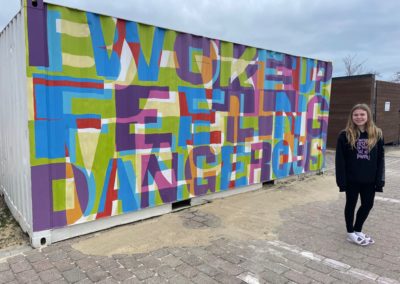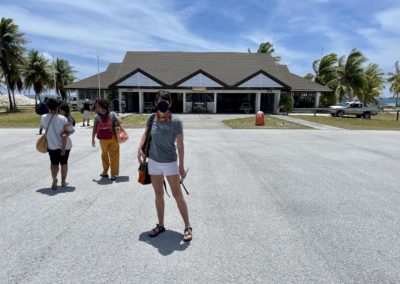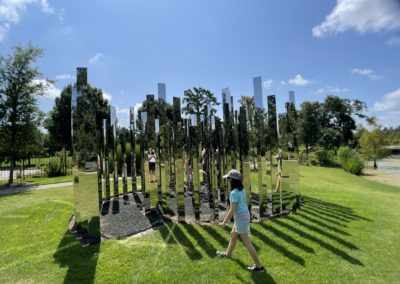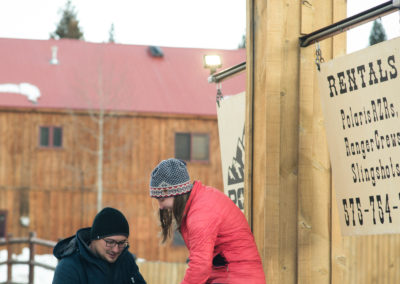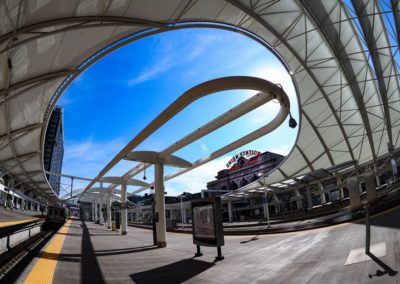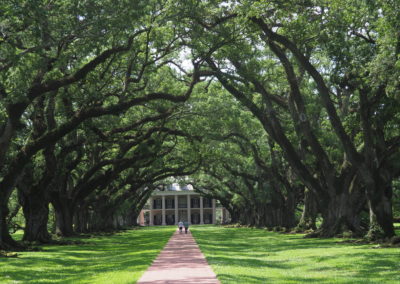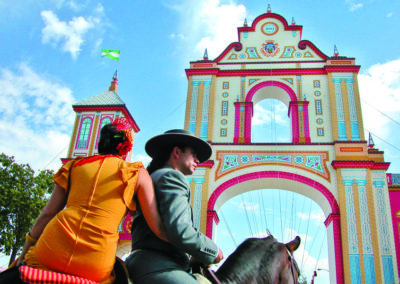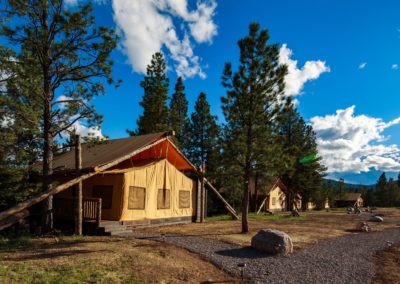It’s only during the last 15 minutes of our tour through pivotal African-American history moments in Memphis that we understand the full significance of who our guide is.
Dressed in a stylish mustard-colored jacket, black turtleneck and slacks, Elaine Turner of Heritage Tours has patiently answered our questions for the past three hours from behind her pandemic-mandated plastic face shield, shepherding us through sobering sights like Slave Haven Underground Railroad Museum, Martin Luther King Jr.’s last march and a newly unveiled Ida B. Wells statue commemorating her anti-lynching crusade beginning in the late-1800s.
On the way to deliver our group back to our hotel, Turner motions for the bus driver to pull over on a side street, and we exit the bus and turn a corner. There on South Main Street, a historic plaque stands dedicated to the Lee sisters, “the most arrested family in the country” — arrested 17 times for participating in lunch counter sit-ins and other protests on behalf of the civil rights movement.
RELATED: Playing in Portland, Austin’s unofficial sister city
And standing before us smiling serenely is none other than a Lee sister herself, referred to on the plaque as Ruth Elaine.
Living civil rights history
Memphis is a southern city known for so many lasting cultural touchpoints: Elvis Presley, Memphis soul music and Beale Street, but a visit here is enriched by paying respects first and foremost to the civil rights legacies that touched the entire nation and continue to inspire. And it doesn’t get much more impactful than meeting a living civil rights hero.
“So this was where I was arrested the first time, and then two sisters were across the street at the department store, and another down the street. There were five of us arrested,” Turner says. Her older sister Ernestine, and younger sisters Sandra, Brenda and Joan were all hauled into jail or juvenile court the same day in August 1960 for the crime of wanting to patronize the same lunch counter, library or store as their white neighbors.
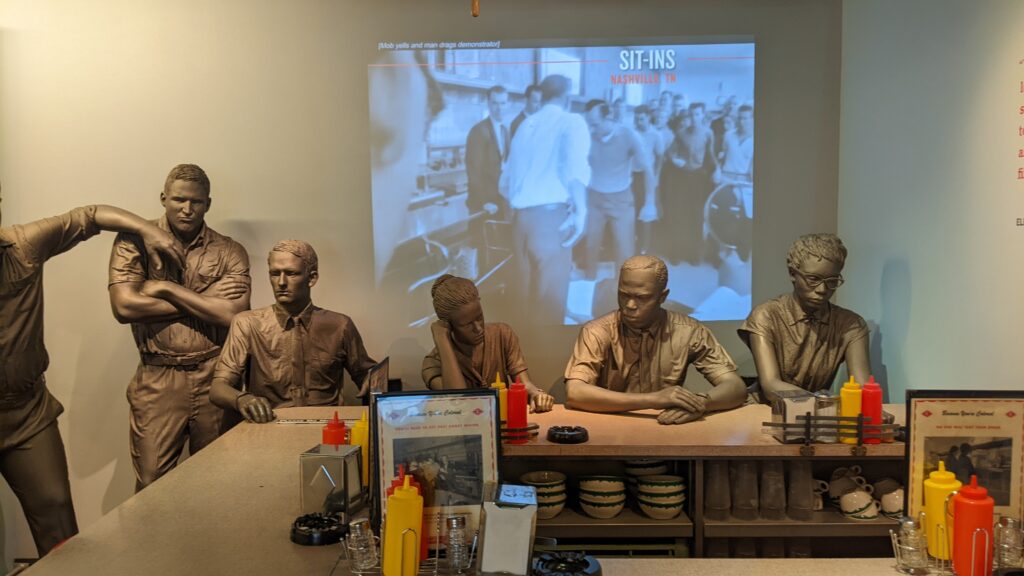
The National Civil Rights Museum in Memphis. Contributed by Cynthia J. Drake
RELATED: 7 magical things to do in Door County, Wisconsin
“This was our main beat, Main Street. We sat in at everything that was segregated,” says Turner, who, along with her sisters, would often cause stores to shut down at the sight of their approach, only to reopen later, causing the Lee girls to double back and proceed with their planned sit-ins.
Turner’s incredible story is just one of several powerfully poignant moments you might experience when traveling through Memphis. Learn not only about the civil rights movement in Memphis but of the nation itself with a visit to the National Civil Rights Museum, located at the site of the Lorraine Motel, where Martin Luther King, Jr. was assassinated on the balcony outside his room on April 4, 1968. The museum catalogues in exacting detail the legacy of racism in the U.S., from Middle Passage to school integration, from lunch counter protests to the rise of King and Malcolm X, along with all the young changemakers who joined them, and finally, to King’s murder.
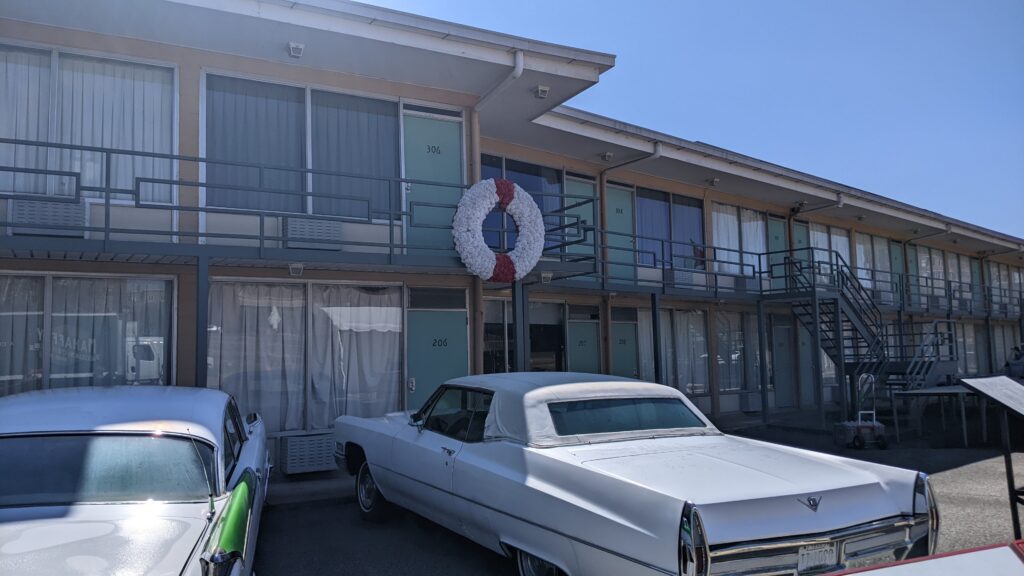
The National Civil Rights Museum at the Lorraine Motel in Memphis, the site of Martin Luther King, Jr.’s assassination. Conributed by Cynthia J. Drake
The museum powerfully shows the faces, writings and voices of the people who fought and often died in the name of making the nation “a more perfect union” — a fight that, as the final exhibit reminds visitors, is far from over.
Memphis soul music and soul food
Visitors can also explore civil rights history through the lens of Memphis soul music, a uniquely American music birthed from gospel roots and distinct from Detroit’s Motown of the same era with its “authentic and pure, not polished” brand, according to the introductory video at the historic Stax Records, where Memphis soul was born in the late ’50s.
Thank Stax, an indie label that at one point brought Black and white artists together to create some of the most iconic songs of the era, for launching artists like Otis Redding, Booker T and the MGs, Isaac Hayes and the Staples Singers.
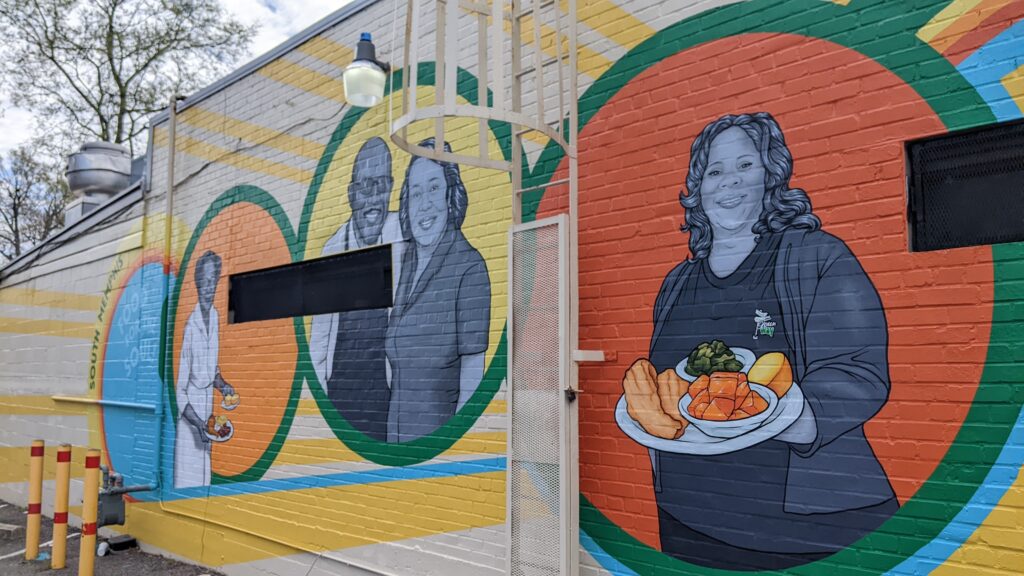
The Four Way in Memphis. Contributed by Cynthia J. Drake
While you’re in the Stax neighborhood, stop by the Four Way soul food restaurant for lunch. This historic family-owned diner dates back to 1946. It was listed in the Green Book, which provided Black travelers with listings of reputable and safe places to eat and stay while traveling during segregation and the Jim Crow Era. The Four Way once hosted the likes of King, as well as many Stax recording artists passing through. Aretha Franklin was born in a shotgun house just a mile away on Lucy Avenue.
“This place is where kings and queens have eaten,” says co-owner Jerry Thompson, noting the numerous celebrities that have graced the doors here over the years. It’s also where Al Green recorded his last music video in 1987, “Everything’s Gonna Be Alright.”
An antique shoe-stitching machine out front lives as a reminder of the restaurant’s origins as part shoe repair shop. “That machine kept our feet dry in the rainy season and warm in the winter time,” Thompson recalls his father-in-law, the former owner, saying. “And when it comes to the Four Way, hopefully the food that they eat and the hospitality that they receive will be filled with warmth and love, and will keep them stitched to this community like that machine kept us stitched.”
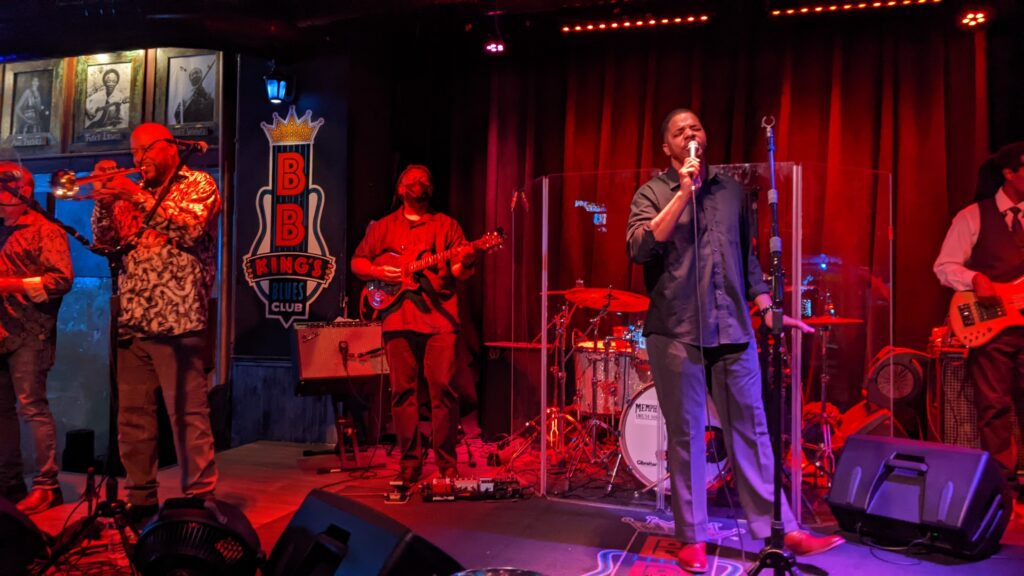
B.B. King’s Blues Club on Beale Street in Memphis. Contributed by Cynthia J. Drake
On our last night in Memphis, we dance at the original location of B.B. King’s Blues Club and Restaurant on historic Beale Street, where the house band is playing classic tunes like Redding’s “Try a Little Tenderness.” Outside, the street is thick with pedestrian traffic, neon lights casting faces with bright glows. So many songs have been written about this city, love letters broadcast from a place of pain and joy — a community stitched by so many generations of brave people looking for some good trouble.
If You Go

Getting there:
Allegiant Air offers low-cost nonstop flights from Austin to Memphis on Mondays and Fridays, with flights starting at just $35 per segment through the summer.

Stay:
Central Station Hotel is a 1914 train station that opened as a hotel in October 2019 showcasing much of the original architecture and signage (including vintage neon train signs). The lobby leads to a showstopper lower-level bar and vinyl record listening space. Nearly 4,000 records are displayed on the wall here, all featuring artists with some sort of Memphis connection, and deejays regularly spin music that’s piped to all the rooms via custom-made speakers.
Do:
A trolley ride gives you a good lay of the land and is just $1 per ride or $2 for a day pass. The last Friday of every month is Trolley Night on South Main. A visit to Crosstown Concourse, an old Montgomery Ward factory now reclaimed as a mixed-use arts and dining space, yields plenty of off-the-beaten-path finds. Take in a show at Hattiloo Theater, a Black repertory theater showcasing independently produced performances featuring local actors. For Elvis fans, Graceland is just 10 miles south of the city.
Eat and drink:
For breakfast, head to Arcade Restaurant, a diner circa 1919 that has dedicated booths to former patrons Elvis and John F. Kennedy. Global Café, over at Crosstown Concourse, offers an eclectic menu prepared by immigrant or refugee food entrepreneurs, each cooking dishes that represent their home countries, such as Syria, Burundi, Mexico, Nepal and Venezuela. Treat yourself to a dinner at Complicated Pilgrim (try the shrimp and grits), a fine French meal at Bishop at Central Station Hotel, or Chef Kelly English’s Spanish restaurant, Pantà. Enjoy astrology-themed drinks with a view (and imaginative decor) at Tiger & Peacock.












